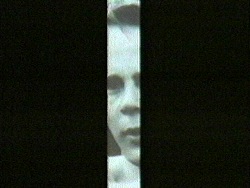Marcel Odenbach
Biography
Since the mid-1970s, Marcel Odenbach has produced an extensive body of tapes, performances, drawings and installations, and has gained recognition as one of Germany's most important artists working in video. His works engage in a provocative discourse on the construction of self in relation to historical and cultural representation.
For Odenbach, identity is defined in the elusive realm of vision — seeing and being seen. Positioning himself, and thus the spectator, in the role of observer, witness, or voyeur, he undertakes a highly charged inquiry into subjectivity within the context of personal and cultural memory, individual and collective history, past and present.
Probing the construction of the self in relation to the psychological and the cultural, from male identity and sexuality to the trauma of German history, Odenbach creates a symbolic theater of memory that includes autobiographical references and appropriated cinematic, archival and mass media images. In many of his tapes, he employs a signature formal strategy as a metaphorical construct, masking or dividing the screen into horizontal or vertical panels, a distancing device that at once limits and expands the field of vision, reveals and conceals. Enigmatic, fragmentary images, glimpsed through censoring black bands or rhythmically juxtaposed in panelled triptychs, create systems of meaning that suggest subconscious associative chains.
Employing a succinct economy of means, works such as The Distance Between Myself and My Losses (1983) articulate rich metaphors for the elusiveness of vision and self-knowledge, positioning identity and desire in a tense relation to history and culture. Odenbach typically juxtaposes emblems of German "high" cultural and historical mythologies — classical and Romantic music and opera, Western literature, art history and architecture, archival films — with subjective references, non-Western music and objects, and images from Hollywood cinema and popular media culture. In As if Memories Could Deceive Me (1986), a piano keyboard, symbol of German bourgeois traditions, is the metaphorical ground upon which he constructs a dynamic discourse of personal and cultural identity, through representations from the Nazi era to contemporary fashion photography. Throughout these works, the always discernible if fragmented physical presence of the artist himself informs his intense and intimate gaze into the self.
Marcel Odenbach was born in 1953 in Germany. He studied art history, architecture and semiotics in Aachen, Germany. From 1992-98, he was Professor at the Staatliche Hochschule für Gestaltung in Karlsruhe. Recipient of the prestigious First Marler Video Art Award in 1984, Odenbach won the Grand Prize at the Locarno Video Festival in the same year. In 1987 he was commissioned by the Centre Georges Pompidou in Paris to produce an installation. Odenbach's videotapes and installations have been exhibited widely at festivals and institutions throughout the world, including group exhibitions at Stedelijk Museum, Amsterdam; The Museum of Modern Art, New York; Documentas 6 and 8, Kassel, Germany; Kunsthaus, Zurich; Neuer Berliner Kunstverein, Berlin; and DuMont Kunsthalle, Cologne. His one-person exhibitions include the New Museum of Contemporary Art, New York; IVAM, Centro Julio Gonzales, Valencia, Spain; Kölnishcher Kunstverein, Cologne, Germany; Galerie für Zeitgenössische Kunst, Leipzig, Germany; Walter Phillips Gallery, Banff, Canada; Museum Folkwang, Essen, Germany; The Institute of Contemporary Art, Boston; Centre Georges Pompidou, Paris; Badischer Kunstverein, Karlsruhe, Germany; Musee d'Art Contemporain, Montreal; and Reina Sofia, Madrid. Odenbach currently lives in Cologne.
